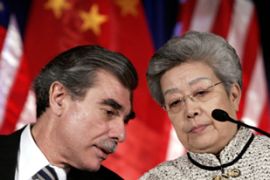US takes WTO action against China
US $200 billion trade deficit sparks action against China’s “illegal subsidies”.

Failed dialogue
Our decision to bring this case to the WTO comes after our efforts at dialogue failed,” Schwab said.
“The case is important because we are seeking to level the playing field to allow US manufacturers to compete fairly with Chinese firms.”
| WTO rules |
|
Under WTO rules, the priority is for countries to settle disputes through consultations if possible. If consulations fail to resolve issues over an agreed period of time(usually 60 days), a WTO panel is set up and panellists appointed to examine the case. |
The decision heralds a shift in US policy away from quiet negotiations with China on a host of trade frictions including Beijing‘s currency regime.
The US trade office said it was seeking formal dispute settlement from the WTO to methods used by China to keep the prices of its exports artificially low.
State subsidies for steel, paper, information technology and other industries allow China to export its goods cheaply and so prevent US companies from competing fairly, both at home and in third markets, it said.
“This case is about standing up for America‘s workers and manufacturers,” Schwab said.
Chips and cars
The case is the third time that the US is taking China to the Geneva-based arbiter of global trade since the Asian powerhouse joined the World Trade Organisation in 2001.
The first case, involving China‘s tax treatment of computer chips, was resolved before it reached the formal WTO dispute stage. But the second, a case against Chinese auto tariffs, is now awaiting arbitration with Canada and the EU alongside the US in its suit against China.
In its annual report published on Thursday, the USTR office and the Commerce Department attacked China for being “unwilling to commit to the immediate withdrawal of the prohibited subsidies in question.”
|
“This case is about standing up for America’s workers and manufacturers” Susan Schwab, US trade representative |
Last week, 23 US senators authorised the application of special duties on imports from China, which they claimed were heavily subsidised by the state and were hurting US manufacturers and workers.
“We believe firmly that the countervailing duty law should be applied to China, and that the department of commerce possesses the legal authority to do so,” the senators said.
They said the $200 billion annual US trade deficit with China was fueled by subsidies provided by the Chinese government to “favoured” industries.
Intellectual property
Also last week, Franklin Lavin, undersecretary of commerce for international trade, said the US government may bring a case against China to the WTO this year over piracy of American goods.
“I would not be surprised if there is a WTO case this year on some IPR [intellectual property rights] issues but I don’t want to get into details on that.”
In a background briefing ahead of Friday’s announcement, officials said the US government would prefer to resolve its trade disputes with China through talks.
“The best enforcement in the world is a diplomatic engagement or a legal discussion that steers a country away from a subsidy policy,” one official said.
“If the problem does exist, however, then you’ve got to go to a formal system.”
Al Jazeera is not responsible for the content of external websites